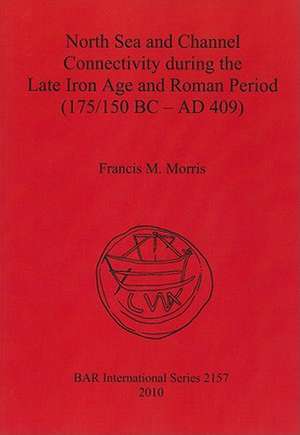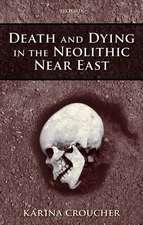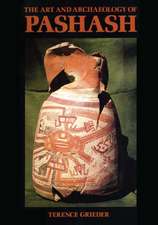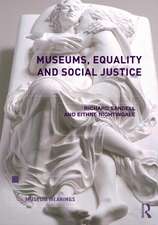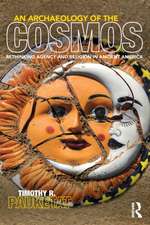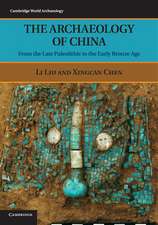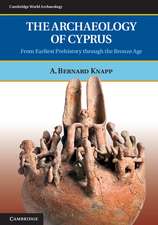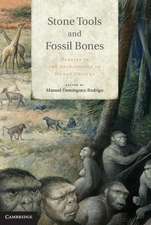North Sea and Channel Connectivity During the Late Iron Age and Roman Period (175/150 BC-AD 409): BAR International, cartea 2157
Autor Francis M. Morrisen Limba Engleză Paperback – 31 aug 2010
Din seria BAR International
-
 Preț: 161.23 lei
Preț: 161.23 lei - 8%
 Preț: 525.44 lei
Preț: 525.44 lei - 8%
 Preț: 509.83 lei
Preț: 509.83 lei - 8%
 Preț: 595.97 lei
Preț: 595.97 lei -
 Preț: 324.72 lei
Preț: 324.72 lei - 8%
 Preț: 614.40 lei
Preț: 614.40 lei - 8%
 Preț: 613.25 lei
Preț: 613.25 lei -
 Preț: 348.85 lei
Preț: 348.85 lei - 8%
 Preț: 454.04 lei
Preț: 454.04 lei - 8%
 Preț: 605.59 lei
Preț: 605.59 lei -
 Preț: 415.04 lei
Preț: 415.04 lei -
 Preț: 398.31 lei
Preț: 398.31 lei - 9%
 Preț: 759.74 lei
Preț: 759.74 lei - 8%
 Preț: 499.33 lei
Preț: 499.33 lei - 8%
 Preț: 653.22 lei
Preț: 653.22 lei - 8%
 Preț: 608.03 lei
Preț: 608.03 lei - 8%
 Preț: 620.35 lei
Preț: 620.35 lei - 8%
 Preț: 523.15 lei
Preț: 523.15 lei - 8%
 Preț: 690.87 lei
Preț: 690.87 lei - 9%
 Preț: 758.06 lei
Preț: 758.06 lei - 9%
 Preț: 889.53 lei
Preț: 889.53 lei -
 Preț: 430.33 lei
Preț: 430.33 lei -
 Preț: 413.51 lei
Preț: 413.51 lei - 8%
 Preț: 518.39 lei
Preț: 518.39 lei -
 Preț: 271.20 lei
Preț: 271.20 lei - 9%
 Preț: 787.78 lei
Preț: 787.78 lei -
 Preț: 301.86 lei
Preț: 301.86 lei - 8%
 Preț: 456.90 lei
Preț: 456.90 lei - 8%
 Preț: 653.06 lei
Preț: 653.06 lei -
 Preț: 329.14 lei
Preț: 329.14 lei -
 Preț: 429.73 lei
Preț: 429.73 lei - 8%
 Preț: 467.75 lei
Preț: 467.75 lei -
 Preț: 399.07 lei
Preț: 399.07 lei - 8%
 Preț: 496.67 lei
Preț: 496.67 lei -
 Preț: 313.90 lei
Preț: 313.90 lei - 9%
 Preț: 1144.93 lei
Preț: 1144.93 lei - 8%
 Preț: 656.78 lei
Preț: 656.78 lei - 8%
 Preț: 444.94 lei
Preț: 444.94 lei - 8%
 Preț: 577.02 lei
Preț: 577.02 lei - 8%
 Preț: 549.09 lei
Preț: 549.09 lei - 8%
 Preț: 642.36 lei
Preț: 642.36 lei - 8%
![Viking Age Amulets in Scandanavia and Western Europe: Site Catalogue [With CDROM]](https://i3.books-express.ro/bs/9781407307138/viking-age-amulets-in-scandanavia-and-western-europe.jpg) Preț: 538.73 lei
Preț: 538.73 lei - 8%
 Preț: 442.84 lei
Preț: 442.84 lei - 9%
 Preț: 808.49 lei
Preț: 808.49 lei - 9%
 Preț: 912.41 lei
Preț: 912.41 lei -
 Preț: 372.20 lei
Preț: 372.20 lei -
 Preț: 395.42 lei
Preț: 395.42 lei -
 Preț: 303.78 lei
Preț: 303.78 lei -
 Preț: 303.02 lei
Preț: 303.02 lei -
 Preț: 186.31 lei
Preț: 186.31 lei
Preț: 598.84 lei
Preț vechi: 650.91 lei
-8% Nou
Puncte Express: 898
Preț estimativ în valută:
114.59€ • 119.88$ • 95.19£
114.59€ • 119.88$ • 95.19£
Carte tipărită la comandă
Livrare economică 03-17 aprilie
Preluare comenzi: 021 569.72.76
Specificații
ISBN-13: 9781407306995
ISBN-10: 1407306995
Pagini: 240
Dimensiuni: 211 x 295 x 18 mm
Greutate: 0.75 kg
Editura: British Archaeological Association
Seria BAR International
ISBN-10: 1407306995
Pagini: 240
Dimensiuni: 211 x 295 x 18 mm
Greutate: 0.75 kg
Editura: British Archaeological Association
Seria BAR International
Notă biografică
Francis M. Morris
